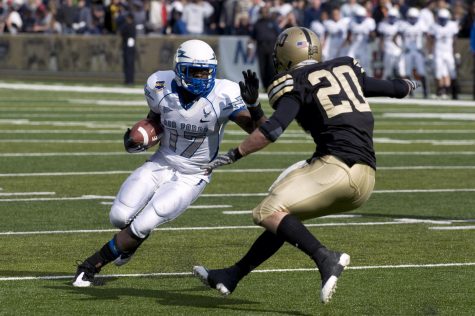New Findings Link CTE to Traumatic Brain Injuries, not Concussions

May 21, 2019
Concussions, and the long term health consequences that come with them, have been an epidemic sweeping across all levels of contact athletics. Sports such as football, rugby, and soccer have taken the most precautions to lessen the likelihood of their athletes sustaining a concussion, given their sports require a great deal of physical blows to the temple, but a new study may have changed the game.
Lee Goldstein, an associate professor of psychiatry at Boston University, conducted a study which determined that it is traumatic brain injuries, not concussions, that cause CTE, and before you consider the two previously stated conditions synonymous, consider the following. A traumatic brain injury (TBI) can be sustained in any number of ways- a car accident, falling down the stairs at your home, a physical workplace incident, and yes, being tackled and thrown on the ground. A concussion is the bruising of one or more lobes of the brain, while a TBI entails blood vessels leaking proteins into adjacent brain tissues, causing inflammation.
The study also revealed that 20% of all posthumous CTE diagnoses were to people that never were involved in a contact sport like football or rugby, but did experience some sort of other incident in which they suffered a blow to the head.
McKee and her team examined the brains of 4 recently deceased teenage athletes, all of whom had participated in contact sports. All of the athletes suffered head injuries 1,2,10, and 128 days before their death. The findings resulted in one case of early CTE, two brains with abnormal tau (a protein in the brain) accumulations, and one with no significant damage. When the researchers then compared 4 brains with no reported cases of head trauma, they found that both sets of brains had different pathologies.
What this means for contact sports is that even though athletes are at a higher risk of suffering a TBI while playing their sport, they are also at risk while driving a car, walking down a flight of stairs, or in any other situation with the possibility of an accident. To put it in numbers, in 2017, there were 190 diagnosed concussions or other head injuries across 32 teams during the NFL regular season. That same year, it is estimated that between 20-50 million people suffered a disabling injury, including a TBI, due to car accidents. Proportionally, that is 11.2% of (reported) TBIs in professional football players compared to the 10.7% of people who suffered a TBI from a car accident. Given that yes, the likelihood of a head injury is greater when playing a contact sport, it is only a .5% difference of the sports with the most reported TBIs and concussions, football, than the likelihood of suffering the same injury in a car accident.
Doctor Kimberly Harmon, PhD, the team physician for the University of Washington football program, recently provided another set of eye opening statistics when it comes to children under 18 years of age and concussions.
“As far as the concussions go, 70% of all concussions in kids under 18 years of age occur outside of organized sports (so things like falling out of trees, skateboarding, biking, car accidents, etc” said Harmon. “So even if kids don’t play organized sports, they still run a high risk of suffering a concussion.”
When asked about the recent study published by the team from Boston University, Dr. Harmon was skeptical on casting blame on TBIs.
“Although the media makes it seem like there is a clear link (from concussions to CTE), there is far more that we don’t know about CTE than we do” said Harmon. “CTE is a pathological finding after death (meaning it is something seen at autopsy after death) that has been associated with depression, angry outburst, weird behavior, etc. There are people who have had the pathologic finding and not had any symptoms and people who have many of these same symptoms and not had the pathologic findings. There are also lots of things that cause the same protein deposition in brains (like narcotics, anabolic steroids, some underlying psychiatric conditions) that former professional football players may have or engaged in so hard to blame all of this on brain trauma.”
With these statistics and research in mind, the question of if parents should let their children participate in contact sports is altered. Originally, youth participation in contact sports was questioned because of the issue of concussions, which is still an issue, but the CTE aspect of it has changed. If a parent is able to put their child in a car and have them drive away, then why would they not let them play a contact sport? The likelihood of a TBI is only raised by .5% when playing a sport anyways.
With these new findings in mind, parents should still take precautions to protect their child’s brain and overall health, but also understand that it is not just contact sports that cause CTE. Members of the Miter staff recalled accounts of peer suffering head injuries playing soccer or performing ballet, meaning that any real physical activity runs the risk of the participant suffering a TBI.
Jack Robinson, a senior at Bishop Blanchet High School, has a strong opinion on the matter of kids playing contact sports, specifically football, due to close family ties with the epidemic.
Robinson’s uncle, Tom McHale, played professional football for the Miami Dolphins, Tampa Bay Buccaneers, and Philadelphia Eagles. McHale passed away after his playing career was over, and in an autopsy, he was diagnosed with CTE.
“I think kids should refrain from contact sports, at least football, until they are in high school,” said Robinson.
In addition to Robinson, Doctor Harmon also weighed in on the issue of parents not allowing their kids to play contact sports due to the concussion epidemic.
“The most dangerous thing for a kid playing these sports is probably the drive to and from practice” said Harmon. “Head-to-head contact should be avoided when possible. Limiting contact in both football and rugby decreases all injuries (not just concussions), plus exercise is good for both physical and psychological health.”
Refraining from contact sports all together is not the answer. Parents should consult doctors and coaches before allowing their children to sign up, and as this new study gains more publicity, their opinions may change. The issue of concussions and player safety is a very real problem in all contact sports, but running the risk of contracting CTE is a possibility of the general population, not just athletes who play contact sports.







